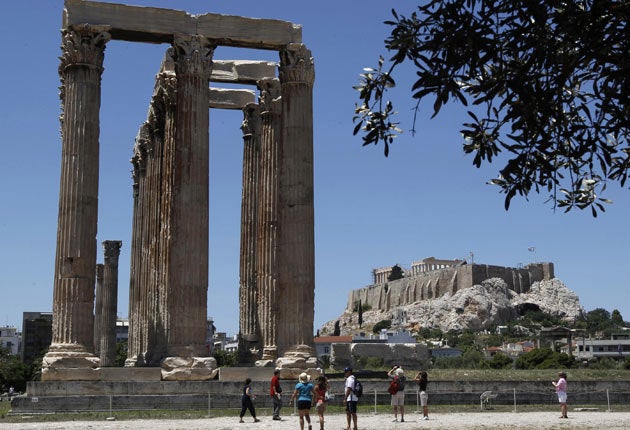Robert Chalmers doesn't like...'Doing the tourist things'

The speech is one you can hear at any time of year, but right now we're approaching high season. It's usually overheard when you're flying back from Athens, Pisa or Minsk (it doesn't really matter where; all foreigners have more fun than we do.) You're just getting used to the strange, empty feeling that descends once you join a check-in queue full of returning English travellers, when you hear the start of that dreaded monologue. It begins – let's say the speaker is returning from Paris – like this.
"So we went to the Louvre, and we cruised down the Seine on a bateau-mouche and we visited the Eiffel Tower and the catacombs at Denfert-Rochereau: we did ... you know ... the tourist things."
That last phrase is delivered with a kind of sly derision. We "did the tourist things." Even though nothing else that you did in Paris (like gawp at Napoleon's tomb, get your mobile snatched at Les Halles, and pay a Senegalese guy £450 for a wooden elephant at Sacré Coeur) is inconsistent with the noun, you were not a tourist.
If the past is another country, then "tourists", like the dead, are a group a certain kind of English traveller is never quite ready to join. But what's so wrong with those coachloads of poor, misguided Japanese that we observe with barely concealed pity when we encounter them at places where we are "doing the tourist things"? Isn't that an honest, sociable, and informative way of visiting a city?
As with most quirks of English society, the whole thing is linked to class. You could spend your entire life drinking in a pub in Burnley – a mixed blessing as destinies go, I agree, but stay with me – and you'd never hear anybody say they'd just come back from Seville and "done the tourist things". It's a statement that implies you have a degree. It's redolent of those Monty Python parodies of coaches filled with common people embarrassing themselves in their ridiculous working clothes, and their ignorance of other cultures.
It wasn't always like this. For the affluent English traveller, "tourist" or at least having done "The Tour" used to be a badge of honour; the Home Counties equivalent of the Hajj. In those days, snobbery was aimed not at poorer compatriots on package holidays (there were none) but at the locals. I have, for some reason, a substantial collection of guidebooks from the turn of the last century.
"The Spanish landlord [Baedeker, 1908] has no idea of how to run a hotel. He seems to think that his knowledge of a foreign language (pshaw!) is sufficient guarantee of his ability to manage."
These days English people "doing the tourist thing" have to speak the language, and respect the locals, who can be grotesquely patronised retrospectively (see Peter Mayle's A Year in Provence and Bill Buford's take on the Tuscan village of Panzano in Heat.)
It's crucial to affect some cultural knowledge of your destination. When I lived in Barcelona, I'm not sure how many times I found myself in some café, next to a group of English visitors rabbiting on about the subtleties of bullfighting (information gleaned from a guidebook and a few half-remembered lines from Hemingway: a man who neatly demonstrated how much he understood about dying with finesse when he opted to use a 12-bore to blow his head off in Ketchum, Idaho.)
Barcelona has voted to ban bullfighting by the end of this year. As early as 1990, the Catalan newspaper La Vanguardia, highlighting the locals' distaste for animal cruelty, ran a piece on the bullring that read: "Blood For The Tourists."
I once sat in a bar near the Ramblas where Pascual, a Catalan friend who had heard enough about the noble Spanish tradition of slaughter from some guy from Brighton at an adjacent table, intervened.
"So," Pascual asked him, "bullfighting is about the appreciation of skill and technique?"
"Right."
"How many people turn up to watch the English fencing finals every year?"
"I don't know." [Puzzled look] "Two hundred?"
"You know," Pascual said, "how you could change that? How you could boost the London economy and fill Wembley Stadium, seven nights a week, all year? Take the guards off the swords. Now tell me you go to a bullfight to watch technique."
And he was right. Given a guaranteed death, fencing could fill Wembley every night. Even those people in the middle seats who won't leave their lobster and Pouilly Fumé merely to see the second half of a Champions' League Final – even they would come.
Not on coach trips, or charter flights, or organised tours of course. They'd make their own way, mingling amiably with the locals. Not as tourists. Just "doing the tourist thing".
Subscribe to Independent Premium to bookmark this article
Want to bookmark your favourite articles and stories to read or reference later? Start your Independent Premium subscription today.

Join our commenting forum
Join thought-provoking conversations, follow other Independent readers and see their replies
Comments